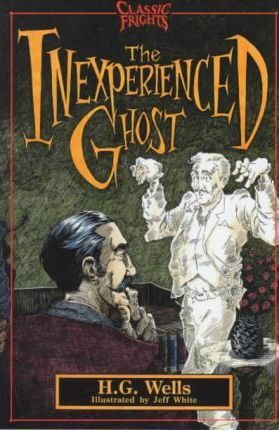“The Story of the Inexperienced Ghost” is a short story by the English author H. G. Wells (1866–1946), first published in the March 1902 edition of The Strand MagazineMonthly publication founded by George Newnes, published 1891–1950, credited with introducing the short story to a British audience. and subsequently reprinted in Twelve Stories and a DreamCollection of 13 short stories by H. G. Wells, first published in 1903. (1903). Clayton, the story’s main protagonist, had encountered a ghost, and falls down dead in front of a group of sceptical friends as he re-enacts the masonic passes he had seen the ghost use to disappear.[1]
Synopsis
The narrator is one a group of friends sitting round a blazing fire in the Mermaid Club one Saturday evening. One of their number, Clayton, tells them about the ghost he encountered in the club the previous evening: “Right off I knew him for a ghost. He was transparent and whitish”. The ghost attempts to frighten Clayton, but emboldened by the bottle of champagne and the several whiskies he had drunk with his dinner he is distinctly unimpressed, and challenges the ghost: “You don’t belong in this place … Are you a member?” Crestfallen, the ghost admits that he had only haunted the club for a “lark”, encouraged by his ghostly friends, but he has forgotten the complicated series of gestures and passes with his hands that would allow him to vanish and return to his own world.
Feeling sorry for the ghost, Clayton helps the apparition to rehearse the required moves by performing them himself so that the ghost might more easily see what error he is making. Eventually the ghost spots the problem and asks Clayton to turn his back while he performs the correct passes, after which he disappears.
At the end of his account Clayton re-enacts the series of passes he learned from the ghost, but with no effect. One of the friends listening to his story is a Freemason, and recognising some of the gesticulations spots the same error that the ghost had seen. Clayton performs the now correct passes, ending with his arms outstretched, swaying slightly. Then he falls forward, dead.
Commentary
Wells himself was not a Freemason.[2]
See also
- H. G. Wells bibliographyList of publications written by H. G. Wells during the more than fifty years of his literary career.
External links
- Full text of “The Story of the Inexperienced Ghost” at Project Gutenberg

